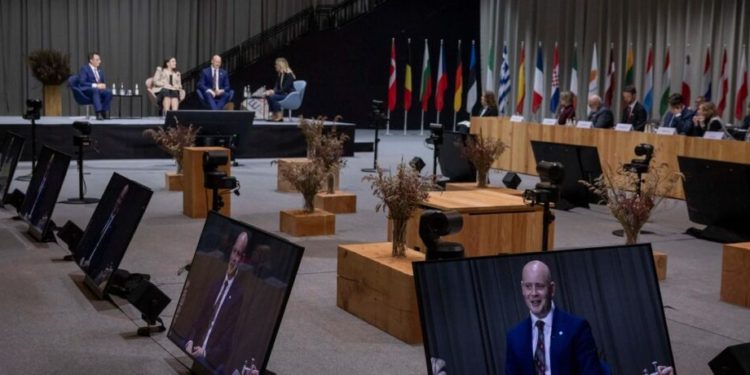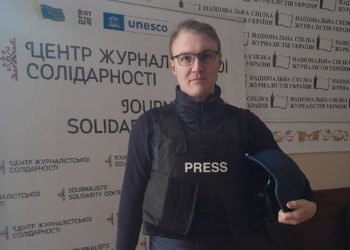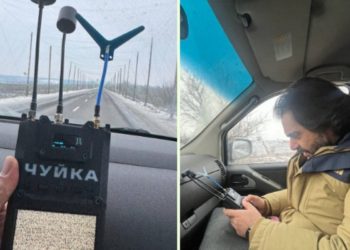Independent media and Europe’s cultural heritage are crucial to ensuring the strength and resilience of EU member states’ democracies in the face of disinformation and foreign interference.
This is stated in the declaration adopted recently in Copenhagen by ministers of culture and media from the European Union, as well as the United Kingdom, Norway, Switzerland, and Ukraine.
“The meeting is informal, but very important in terms of supporting Ukraine,” emphasizes the President of the National Union of Journalists of Ukraine (NUJU), Sergiy Tomilenko. “In Ukraine, we understand the words of the declaration differently than many others. When there is war all around, journalism ceases to be just a job. It becomes a duty – to speak for those who cannot, to show what they are trying to hide.”
The declaration is supported by 26 of the 27 EU countries, as well as the United Kingdom, Ukraine, Iceland, Norway, and Switzerland. Only Hungary chose not to support it.
Declaration on the necessity of culture and media as a safeguard for our European democracies
It is more important than ever that we actively safeguard our European democracies and ensure their resilience. In our efforts to do so, it is vital that the intrinsic value and power of our culture, cultural heritage, and independent media are further recognised. We believe that culture, cultural heritage, and free, pluralistic, and independent media play a significant role in protecting and promoting European values and democratic resilience.
To strengthen our democratic resilience, we must draw upon our shared European history, values and identity – the very foundation of what defines and unites us. Europe’s rich and varied heritage and cultural diversity are woven into the fabric of this identity, telling the story of where we come from and how history has shaped the Europe we are today. We believe that the protection and promotion of our cultures and cultural heritage, in all their richness and diversity, should be considered as an integral part of European security policy.
Free, independent and diverse media remains our best source of trustworthy, accurate and reliable information which can, in turn prevent the erosion of trust in our democracies, in the media themselves, and, most importantly, in each other. Such media are essential for fostering a thriving civic sphere and for safeguarding democracy and fundamental rights, including the right to information. In doing so, they strengthen and secure sustainable public spaces for democratic discourse while serving as a safeguard against foreign information manipulation, interference, and disinformation. In this regard, media and information literacy is an essential component for democratic resilience.
The use of AI in producing and distributing cultural and media content raises ethical, societal, and economic concerns, as well as questions of reliability. It is becoming increasingly difficult to distinguish between authentic and AI-generated or manipulated material online, creating uncertainty about authorship, intellectual property, and accountability. Digitally manipulated images and videos can create fundamental doubts about what is a true representation of reality and what is not. Protecting the integrity of cultural expression and the personal characteristics of our citizens is paramount. We find this to be important for our society and as a part of properly functioning democracies.
This declaration serves as a reminder that culture, cultural heritage, and media policies must be a vital part of the European collaboration and European security in order to protect our democracies. We commit to upholding cultural diversity, artistic freedom, and supporting media pluralism and freedom at both the national and European level. We also recognise the need for guaranteeing citizens’ access to trustworthy news media and to equip them with the digital skills and critical thinking abilities needed to navigate a digitised information landscape.
In this light, we agree to the following guiding principles:
- Our citizens must live in societies with free and independent cultural life.
- Our citizens must live in societies where culture and cultural heritage are safeguarded for the benefit of society today and for future generations.
- Our citizens must have access to reliable information and to an information environment free of foreign interference.
- Our citizens must live in societies with free, resilient, and independent media.
- Our citizens must be able to participate in public debate and democratic
conversations.
- Our citizens – especially our children – must be presented with and have access to
free and diverse European content.
- Our citizens must be protected against digital replicas of their personal
characteristics without consent.
Signees:
Andreas Babler, Minister for Housing, Arts, Culture, Media and Sport
Austria
Elisabeth Degryse, Minister-President in charge of Budget, Higher Education, Culture and
International Relations
(French community)
Jacqueline Galant, Minister for Sport, the Civil Service, Administrative Simplification and Media
(French community)
*Minister-President Degryse and minister Galant are also signing on behalf of their colleagues – Caroline Gennez, Flemish Minister for Welfare, Poverty Reduction, Culture, and Equal Opportunities, Cieltje Van Achter Flemish Minister for Brussels Affairs and Media and Gregor Freches, Minister for Sport, Culture, Tourism and Media (Germanspeaking community) Belgium
Marian Bachev, Minister of Culture
Bulgaria
Nina Obuljen Koržinek, Minister of Culture and Media
Croatia
Martin Baxa, Minister of Culture
Czechia
Konstantinos Ioannou, Minister of Interior
The the Republic of Cyprus
Dr Vasiliki Kassianidou, Deputy Minister of Culture
Republic of Cyprus
Jakob Engel-Schmidt, Minister for Culture, Media and Sports
Denmark
Kristiina Alliksaar, Secretary General of Estonian Ministry of Culture
Estonia
Mari-Leena Talvitie, Minister of Science and Culture
Finland
Rachida Dati, Minister of Culture
France
Dr. Wolfram Weimer, Minister of State for Culture and the Media
Germany
Dr. Lina Mendoni, Minister of Culture
The Hellenic Republic
Pavlos Marinakis, Deputy Minister to the Prime Minister and Government Spokesman
The Hellenic Republic
Logi Mar Einarsson, Minister of Culture, Innovation and Higher Education
Iceland
Patrick O’Donovan, Minister for Culture, Communications and Sport
Ireland
Alessandro Giuli, Minister of Culture
Italy
Agnese Lāce, Minister of Culture
Latvia
Raminta Popovienė, Minister of Education, Science and Sports, acting Minister of Culture
Lithuania
Elisabeth Margue, Minister Delegate to the Prime Minister for Media and Connectivity
Luxembourg
Eric Thill, Minister for Culture
Luxembourg
Owen Bonnici, Minister for Culture, Lands and Local Government
Malta
Lubna Jaffery, Minister of Culture and Equality
Norway
Gouke Moes, Minister of Education, Culture and Science
the Netherlands
Marta Cienkowska, Minister of Culture and National Heritage
Poland
António Leitão Amaro, Minister of the Presidency
Portugal
András István Demeter, Minister of Culture
Romania
Martina Šimkovičová, Minister of Culture
Slovak Republic
Marko Rusjan, State Secretary
Slovenia
Ernest Urtasun Domènech, Minister for Culture
Spain
Óscar López Águeda, Minister for Digital and Civil Service Transformation
Spain
Carine Bachmann, State Secretary and Director General of the Federal Office of Culture
Switzerland
Bernard Maissen, State Secretary and Director General of the Federal Office of Communications
Switzerland
Parisa Liljestrand, Minister for Culture
Sweden
Tetyana Berezhna, Deputy Prime Minister for Humanitarian Policy, Minister of Culture
Ukraine
MP Hon Ian Murray MP, Minister for Creative Industries, Media and Arts
United Kingdom

 THE NATIONAL UNION OF
JOURNALISTS OF UKRAINE
THE NATIONAL UNION OF
JOURNALISTS OF UKRAINE
















Discussion about this post